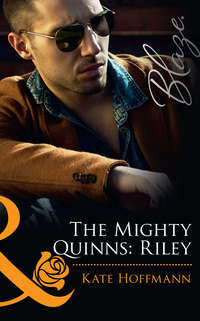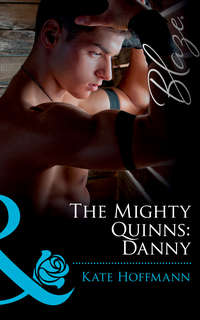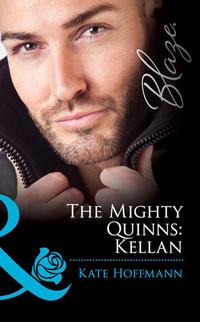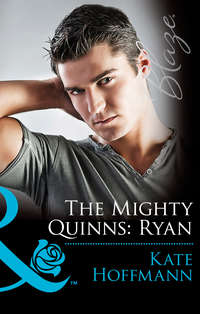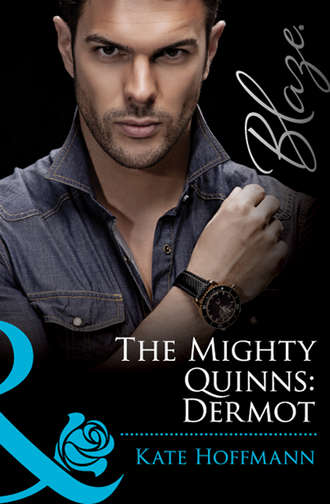
Полная версия
The Mighty Quinns: Dermot


Praise for Kate Hoffmann from RT Book Reviews
The Charmer “Hoffmann’s deeply felt, emotional story is riveting. It’s impossible to put down.”
Your Bed or Mine? “Fully developed characters and perfect pacing make this story feel completely right.”
Doing Ireland! “Sexy and wildly romantic”
The Mighty Quinns: Ian “A very hot story mixes with great characters to make every page a delight.”
Who Needs Mistletoe? “Romantic, sexy and heartwarming”
The Mighty Quinns: Teague “Sexy, heartwarming and romantic… a story to settle down with and enjoy—and then re-read.”
Dear Reader,
Can you believe it? I’ve found another Quinn family and this time they’re living in Seattle. Isn’t it amazing how these handsome Irish-American guys turn up, just when I need them?
I’ve lost count of how many Quinn books I’ve done, but it’s been quite a saga, moving from the US to Ireland and Australia and then back to the US again. This new addition to the family story introduces Dermot Quinn, a high-powered Seattle yacht salesman. Only, in this book, you won’t catch him in any West Coast boardrooms. No, Dermot’s on a journey, one instigated by his wily grandfather. And his destination is a place very dear to my heart, my home state of Wisconsin. I’ve always wondered if I could set a Mills & Boon® Blaze® book on a farm and now you’ll see that I have. Yes, a farm can be a very sexy place.
But Dermot isn’t the only Quinn on this quest. His brothers, Cameron, Kieran and Ronan, will suddenly find themselves out of their comfort zones, as well—and they’ll love every minute of it. Watch for their books in September, October and November of this year.
Until next time, happy reading!
Kate Hoffmann
About the Author
KATE HOFFMANN began writing for Mills & Boon in 1993. Since then she’s published sixty-five books. When she isn’t writing, she enjoys music, theater and musical theater. She is active working with high school students in the performing arts. She lives in southeastern Wisconsin with her cat, Chloe.
The Mighty
Quinns: Dermot
Kate Hoffmann

www.millsandboon.co.uk
Prologue
DERMOT QUINN buried his face in his pillow, fighting back tears. He wasn’t going to cry. Nine-year-old boys didn’t cry. And if he cried, then that was just admitting that he believed his parents were dead. He squeezed his eyes tightly shut. “Don’t cry,” he murmured. “Don’t cry.”
He heard a sound at the door and sat up, brushing an errant tear from his cheek. His twin brother, Kieran, slipped inside the room and shut the door behind him. He crossed to the bed and sat down on the edge.
“He’s wrong, you know,” Dermot said stubbornly.
“How do you know?”
Dermot shrugged. “Because. They can’t be dead. I think they’re coming back. We’ll be getting ready for school and they’ll walk in the door. I know it.”
His parents, Jamie and Suzanne, had left four months ago from Seattle, the two of them sailing a yacht that the family boat business had built for a wealthy customer in Australia. They were due to meet up with the owner in Vanuatu six weeks later.
It was supposed to be a family trip, but they’d left early when the owner decided to change the delivery date. Dermot and Kieran, along with their eleven-year-old brother, Cameron, and seven-year-old brother, Ronan, would live with their grandfather for the last month of school.
Dermot wiped his runny nose with the back of his hand. He crossed his legs in front of him. “What do you think happened?”
Kieran considered his answer. “I think they’re on an island somewhere. Waiting for someone to find them. There was a storm… or—or a whale… and they got in their life raft before the boat sank.”
Kieran had always told the truth and if he believed, then Dermot had hope.
“The life raft washed up on shore in the middle of the night,” Dermot said. “And when the sun came up, Da got out and looked around. The island was big, with a thick jungle in the center and white sand beaches. They still had the fishing kit from the life raft. Da fishes while Mom hunts for fruit. Bananas and coconuts. They build a little hut from sticks and palm leaves. And they build a signal fire on the beach so that they’ll be ready when another boat sails past.”
Kieran nodded. “Yeah. That’s it. They’re just waiting.” He drew a ragged breath. “Do you think they miss us?”
“Yeah,” Dermot said. “Sure they do. But they’ll be back.”
“Promise?”
“Promise,” Dermot said.
The bedroom door opened again and they both turned to see their older brother, Cameron, standing in the wash of light from the hall, Ronan peering out from behind him. “Grandda wants us to go over to our house and pick up some of our things.”
Dermot scrambled off the bed. “We’re not going to live in our house anymore?”
Cameron shook his head. “We’re going to live here with him. He said he’ll find someone to move our bedrooms over. And our other stuff, too.”
“What about Ma and Da’s stuff?” Ronan asked.
“I don’t know,” Cameron said. “I was afraid to ask him. I don’t think he wants to talk about it. You know how he is. ‘Chin up, lad. Don’t want ta have ta care for a babby.’” Cameron did a perfect imitation of their grandfather’s thick Irish accent. “We’ll be all right,” he said.
Dermot slowly crossed the room and stood next to Cameron. Kieran joined them a few seconds later. “We’re on our own now, lads,” Cameron said, wrapping his arm around Ronan’s shoulders. “We need to be strong and brave and we need to pray every single night that this is just a bad dream and that we’ll all wake up very soon.”
1
DERMOT QUINN was in the middle of a very vivid dream when incessant knocking interrupted him. He slowly opened his eyes, groaning at the morning light that streamed through the bedroom windows of his houseboat. It was a sunny day in Seattle and though he was usually loath to waste good weather, Dermot turned onto his stomach and pulled the pillow over his head.
The subtle scent of a woman’s perfume teased at his nose and he pushed up, frowning. Kelly had spent the night last night. They’d met up, as they did on occasion, had a few drinks and come back to his place for a night of NSA sex. Dermot glanced over at the bedside clock. As was her custom, she usually left at dawn for her regular early-morning workout, neatly avoiding any uncomfortable conversation about the night before.
But then, maybe she’d decided to come back for another few hours of fun. Dermot grinned and threw off the covers. He pulled on a pair of jeans that were tossed over the end of the bed, then walked to the front door. Though he and Kelly followed a very well-honed set of rules, he wasn’t averse to breaking them occasionally.
“You could have left the door unlocked,” he called as he pulled it open.
But Kelly wasn’t waiting on the other side. Instead, he was treated to the sight of his twin brother, Kieran, glaring at him impatiently. “Jaysus, man, do you never answer your cell phone? I’ve been calling you for the past hour.”
“I turned it off,” Dermot said. “What are you doing here? It’s Saturday morning. Don’t you ever sleep in?”
“Get dressed,” Kieran ordered. “I got a call from Grandda. He wants to see us all in fifteen minutes. In his office.”
“On a Saturday?”
Kieran nodded. “Yeah, I know. Something’s up and I’m worried.”
“What do you think it is?”
“Hell, I don’t know. Grandda’s been shut up in his office all week. I’m thinking that he might have gotten an offer on the business.”
Dermot and his three brothers had worked for Quinn Yachtworks since they were kids. They all started out sweeping the floors and running materials between the warehouse and the shop. Their grandfather, an Irish immigrant, had founded the firm in the early seventies. A widower with a two-year-old son to care for, he’d arrived in the U.S. a week after Kennedy had been inaugurated, ready to make a life for himself and his motherless son.
After the disappearance of their parents, it was assumed that the business would be left to Cam, Kieran, Dermot and Ronan once their grandfather retired. But Martin had been reluctant to name one of the boys CEO, causing the brothers to wonder what the plan might be.
“You don’t think he’s sick, do you?” Dermot asked.
Kieran frowned. “What makes you say that?”
“I don’t know. He’s seventy-seven years old. People get sick when they’re older.”
“Don’t say that.” Kieran shook his head. “Don’t even think that. He’s fine. We’d know if there was something wrong. We’d see it.” He strode through the house to Dermot’s bedroom, then picked up a shirt from the floor and tossed it at his brother. “Get dressed. We’re going to pick up Cameron on the way and talk about this before we go to the meeting.”
“What about Ronan?”
“He’s already over there.”
“What do we have to talk about? We don’t know what he’s going to say.”
“We can guess,” Kieran said. “If he plans to sell, we have to work up a counteroffer.”
“Do we really want to do that?”
“Yes!” Kieran said. “You want to keep your job, don’t you?”
In truth, Dermot hadn’t really thought much about it. He liked working for the company. It paid well, it gave him the freedom to come and go as he pleased. As the director of sales, he had a chance to travel and meet interesting—and very wealthy—people. It wasn’t what he’d dreamed of as a kid, but childhood dreams didn’t pay the mortgage. What wasn’t there to like?
Kieran ran the financial end of the business. He’d always been the organized one, the one who could maintain a laserlike focus on the bottom line. Cameron, their older brother, headed the design department, handling the details of what a Quinn-built yacht looked like. And Ronan supervised the manufacturing end of things.
Between the four of them, they were able to do almost any job in the company, and under their management, the business had thrived. “Maybe he’s trying to decide who will be in charge,” Dermot suggested as he pulled on his T-shirt. “We can’t all have the final say on all decisions.”
“Maybe,” Kieran said. “So, who do you think should be the one?”
“Me,” Dermot said, knowing full well the answer would irritate his brother. Of course, Kieran was the one who had the best sense of how the company operated as a whole. But then, without Cameron, the true creative genius behind the designs, the company probably wouldn’t be such a success.
“Without sales, the company wouldn’t survive,” Dermot said. “If you can’t sell boats, what do you have?”
“You don’t have a clue how the Yachtworks runs,” Kieran said. “You’d have us bankrupt in a year.”
“Cameron thinks he should be in charge,” Dermot said. “Maybe he should. Without his design talent, we’d be in trouble. I’m not sure Ronan even cares, one way or another.”
“Are you saying I’m replaceable?” Kieran asked.
“Not as replaceable as I am.”
“It’s Cameron, then. We both agree. If it comes down to that today, it’s Cameron.”
Dermot slipped into his boat shoes then nodded. “Let’s go find out.”
The drive from Dermot’s Lake Union houseboat to his brother’s home in the Queen Anne neighborhood took ten minutes. Cameron was waiting for them, seated on the front steps of the bungalow. He hopped in the back of Kieran’s BMW and had barely closed the door before jumping into the conversation. “What do you think this is about?”
“It could be nothing,” Dermot said. “Why are we even speculating? Maybe he just wants us to sign some papers. Or maybe he’s finally decided to take a vacation.”
“That might be it,” Kieran said. He paused, then shook his head. “He’s spent his life building the company. He loves work. Why would he start traveling now?”
“He’s always talked about sailing around the world,” Cameron suggested.
They passed the rest of the ride in silence, each one of the brothers caught up in his own thoughts as they headed toward the Yachtworks. Dermot wasn’t sure which theory he subscribed to.
His grandfather had rarely summoned them all to his office at the same time. The last time it had happened he’d announced that the company would be building a new addition to the finishing department. But with the economy in a downturn, Dermot doubted there would be news of that sort to convey.
The chain-link gates were open when they arrived, and Kieran steered the car through them and parked in front of the main offices next to Ronan’s SUV. Quinn Yachtworks was located along the Salmon Bay waterway, a perfect location for launching the luxurious sailboats that they built. They’d become one of the most successful custom builders on the West Coast, with business moguls, sports stars and Hollywood celebrities as clients.
Their grandfather’s faithful executive assistant, Miriam, was sitting at her desk when they arrived. As always, she greeted them stoically, giving no clue what awaited them inside the wood-paneled doors.
“Sit,” Martin said as they walked in, shuffling the papers on his desk as he spoke. Ronan looked up from his spot on the leather sofa, his gaze filled with concern. “I expect you’re wondering why I’ve called this meeting, so I’ll get right to it.” He leaned back in his well-worn leather chair. “Our corporate attorney has advised me that it is time for me to start thinking about my successor.”
Dermot watched a strange expression settle on his grandfather’s wrinkled face. Martin Quinn was not the kind of man who liked to be reminded of his mortality and this was no exception. Dermot cursed silently. “You’re not going to retire, are you?”
“Not tomorrow. But he’s right,” Martin continued. “It’s time to put my affairs in order.”
“Is everything all right?” Cameron asked. “I mean, are you well?”
“Fit as a fiddle,” Martin said. “But there are practical reasons for this decision. When your parents died, I brought you boys to work with me. You spent your afternoons and weekends learning the business, instead of doing things you wanted to do. You see, I thought it was the best way to deal with your grief. Now I see it was the best way to deal with my grief.”
“We liked working here, Grandda,” Kieran said.
“But you all had your own dreams. Dermot, I remember you wanted to be a veterinarian. And, Cam, you wanted to be an archaeologist.”
“Paleontologist,” Cameron corrected.
Martin nodded. “Right. And Kieran, you wanted to be a… Well, I don’t recall, but—”
“A cowboy,” Kieran said. “Or a Royal Canadian Mounted Policeman.”
Their grandfather nodded. “And, Ronan, I think all you ever wanted was to have your parents back again. The point is, I never gave you the chance to follow those dreams. And now that I have to decide whether to leave this business to you or sell and make all of us extremely wealthy, I realize that you might not be prepared to make a decision about your future. I don’t want any of you to tie yourself to a business that isn’t part of your own dreams.”
Kieran shook his head. “Grandda, we would never—”
“Let me finish.” He folded his hands on his desk and looked at them individually. “I came to this country with one hundred dollars in my pocket and the intention of making something of my life so that I could support my son. I made my own life, something you boys haven’t had the chance to do.”
“We love working for you,” Cameron said. “It’s a family business and family sticks together.”
“That’s a lovely sentiment,” Martin replied. “But it doesn’t make my decision any easier. So, I have a plan. I’m going to give each of you boys one hundred dollars cash, a company credit card and a bus ticket. I want you to go out there and spend some time in the real world. Find a job. Meet new people. See what life is like all alone in the world. Believe me, without all the comforts of home, you’ll have time to figure out what you really want out of life.”
Dermot opened his mouth to protest, but his grandfather held up his hand. “Give yourself six weeks. If you’re still interested in running the Yachtworks after that, I’ll be satisfied.”
Cameron gasped. “You’re kidding, right? You just expect us to take six weeks away from work? I have projects going.”
“Although we’d all like to think we’re indispensable,” Martin said, “if one of us fell off the planet tomorrow, the company would go on.” He stood and handed each of them an envelope.
“You have tonight to pay your bills and put your affairs in order,” Martin said. “You leave tomorrow morning. Go out and imagine a different life for yourselves, boys. And when you come back, come back with a decision.”
“Vulture Creek, New Mexico?” Cameron asked.
Dermot opened his envelope and withdrew his bus ticket. “Mapleton, Wisconsin. What the hell is in Mapleton, Wisconsin?”
“Bitney, Kentucky,” Kieran muttered. “Great.”
“Sibleyville, Maine. Jaysus,” Ronan said. “I’ll be on the bus for a week.”
The brothers looked at each other, shaking their heads.
Martin smiled. “Good luck. And I’ll see you in six weeks.”
RACHEL HOWE grabbed the fifty-pound bag of feed, wrapping her arms around it and lugging it to the back of the pickup truck.
“You need some help with that, little lady?”
She glanced over at the two old men watching her from their spot on the front porch of the local feed store. “Nope,” she said, forcing a smile as the bag began to slip through her arms. “I’ve got it.”
Wincing, she took a deep breath and heaved the sack toward the tailgate of the truck. But at the last second, it fell out of her arms and dropped onto her foot. Rachel cursed, then kicked the sack. How would she ever make this work? She couldn’t even load a pallet of feed bags onto the truck, much less run a farm with absolutely no help beyond her eighty-year-old uncle.
She was virtually alone in this, with nothing but her determination to keep her company. Her father had maintained the dairy until the day he’d died and he hadn’t had help. If a seventy-five-year-old man had managed, certainly his twenty-five-year-old daughter could.
Though she’d put a help-wanted notice in the grocery store and in the feed store, hoping to find a high school boy to relieve her of the heavy lifting, there hadn’t been any takers. Her father’s bachelor brother, Eddie, was still able to help with the milking but the heavy work was beyond his capabilities.
Maybe all the potential workers knew what everyone else in Mapleton knew—that without help, Rachel’s time as a dairy-goat farmer was going to be short-lived at best. Maybe they were right. Maybe she ought to just sell and get on with her own life. A surge of temper caused her face to flush and she reached for the sack again, determined not to fail in front of two more doubters—Harley Verhulst and Sam Robson.
“Are you sure we can’t give you a hand?” Harley asked.
“No,” Rachel snapped. “It’s just going to take me a while to work up my strength.”
“A little girl like you shouldn’t be running that farm all by your lonesome,” Sam commented. “You need to find yourself a husband.”
“Preferably one with very big muscles,” Harley added.
A husband? Right now she’d be satisfied with one reasonably handsome, completely naked man to tend to her sexual needs once a week. She was quite willing to work out some kind of barter, maybe do his laundry or iron his shirts. It could be a mutually beneficial arrangement.
Rachel gritted her teeth and grabbed the feed sack again, this time using her sexual frustration for extra strength. When she got it up on the tailgate of the pickup, she smiled to herself. But when she looked over at the pallet, she cursed.
From now on, she’d get the feed mill to deliver her supplies, eliminating the need to pretend she knew what she was doing. Though it might be tough to work into the budget, she’d find a way. Rachel wasn’t ready to concede defeat. Not yet.
She glanced over at the two men and sent them a withering look. “Do you two plan to stand there pestering me or do you have work to do? Your wives will be happy to know you’ve taken such an interest in my dilemma. I’ll be sure to tell them how helpful you were the next time I see them at the grocery store.”
Chastened, the two farmers wandered back inside the co-op, leaving Rachel to tend to her business in solitude. She turned her attention back to the pallet of feed sacks, knowing that it might not be possible for her to load them all onto the truck by herself—at least by sundown. But she was going to die trying. “Just think about sex,” she muttered to herself. “And how little of it you’ve had in the past year.”
“Can I give you a hand?”
Rachel spun around, ready to decline the offer with a curt dismissal. But the man standing behind her smiled and her breath caught in her throat. She felt a bit light-headed, then realized it was time to draw another breath.
He was dressed in a comfortable shirt and jeans, clothes that hugged a slender, but muscular body. In his right hand, he carried an expensive leather duffel. She glanced at his shoes and noted that they were expensive, too. Not the kind of wardrobe usually found outside the feed store.
“Are you all right?” he asked.
Gosh, he was handsome, she mused as she looked back into his pale blue eyes. Dark hair that was just long enough to make him look a bit dangerous. A perfectly straight nose and a smile that sent a flood of warmth racing through her bloodstream.
Sex, she thought to herself. As if she’d wished it and it had just appeared. Rachel had long ago come to the conclusion that there weren’t any interesting men in all of Walworth County. But obviously one had managed to sneak over the border from Illinois and was now standing directly in front of her.
“Oh, my.” Rachel swallowed hard, then reached down to pick up the next bag of feed. She’d be just fine once he stopped staring at her. “You’re obviously lost,” she said, shaking her head. “Or you’re just a figment of my imagination.”
“What?”
Rachel glanced over her shoulder. “Men that look like you don’t live in places like this.” She straightened. “If you just take this road right here out to Highway 39 then stay on 39, it will take you to the interstate. You’ll be back in Chicago in a few hours.”
“Why do you think I’m from Chicago?”
“You have big city written all over you,” she said. “Mostly it’s the shoes. And the duffel.” She bent again to grab a feed sack, but he stopped her.
“Allow me,” he said, dropping his duffel in the dusty parking lot. He picked up the sack, then easily tossed it onto the bed of the truck. “Another?”
“Yes,” she said, the word coming out on a rush of air. “Thank you.” She pointed in the direction of the pallet. “All of them have to go. Here, let me give you a hand.”
“No problem,” he said. “You must have some hungry cows.”
“Goats. I raise goats.”
“Interesting,” he said. “I’ve never met a goat farmer before. Then again, I don’t know any cow farmers either.”
A laugh burst from Rachel’s lips. “Sorry. I know you’re trying to be polite. It’s just that some days goat farming is far from interesting.” She stepped back as she watched him hoist another sack into the truck. “I run a small dairy. It belonged to my family—my grandparents first, and then my father. And—and now it belongs to me.”



